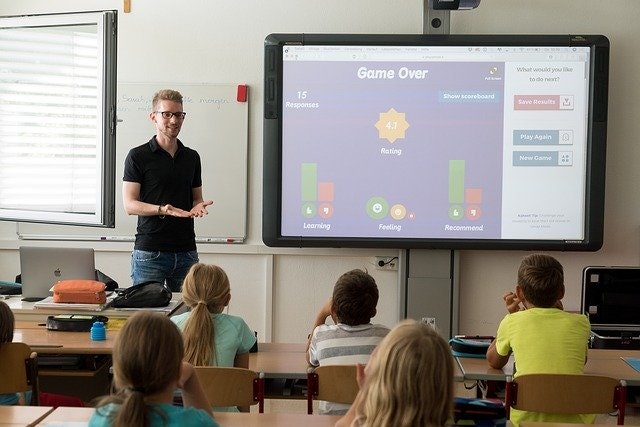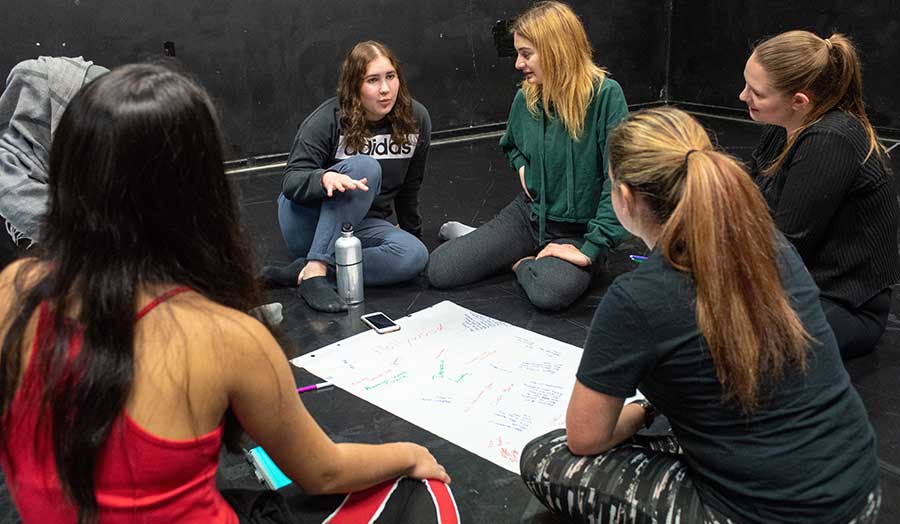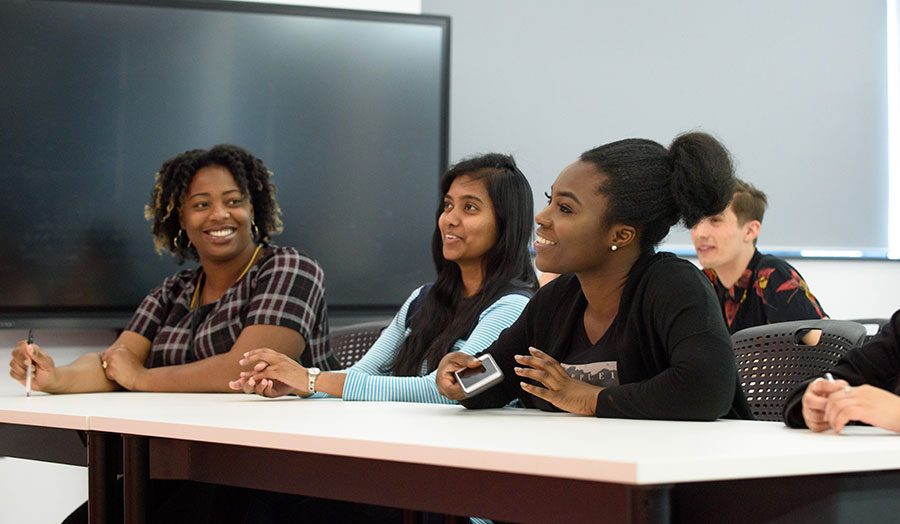- Log in
- Site search

Personal statement for PGCE primary
This is your chance to explain why you want to teach primary age children and convey your enthusiasm for teaching
This example should be used for guidance only. Copying any of this text could significantly harm your chances of securing a place on a course.
Example personal statement for PGCE primary
In my early education, reading and writing were a challenge. At age nine I received a diagnosis of dyslexia bringing with it extra support from the school. This gave me a real determination to overcome my disability. It drove me to study hard, achieve high GCSE and A-level grades and go on to achieve a 2:1 in criminology at the University of England. Although this is not a national curriculum subject, working through and coping with my dyslexia at university helped me nurture my own love of learning. I aim to emulate the support provided to me to ensure that no child is left behind in their learning due to barriers they may experience. I believe that being dyslexic will give me a unique insight into the support requirements of dyslexic children but I am aware that children face many other personal, social and emotional challenges alongside learning disabilities. Recognising these barriers and helping each child to have the confidence to succeed is one goal I hope to achieve as a teacher.
I began spending one day a week, then two days a week in a primary school, which has strengthened my love of learning. I spent time in both Key Stage 1 and 2 classrooms and have so far completed 40 days in a school. I observed lessons such as English, maths, Spanish, science and art, listened to pupils read, and went on to work with small groups. I started to grasp lesson planning and discuss with teachers' current educational issues, such as the changing curriculum. I was able to observe how different teachers handle classroom and behaviour management, particularly picking up on the importance of maintaining an assertive yet sympathetic style. This all shapes my classroom practice to become more effective, for example seeing someone moving up a reading band as a result of the extra time I gave to them. Recently I saw a child making good decisions with their behaviour as a result of the plans we made together. I am gaining experience currently with a year three class of 30 children, working with them one-to-one, in groups and leading the whole class. Learning to think on my feet numerous times a day is challenging but rewarding, especially when I receive positive feedback on my lessons.
For the past two years I have been a volunteer leader with my local Cub Scout group, consisting of 30 boys and girls aged between eight and ten years. This encompasses weekly meetings, trips and overnight camps. During camps, along with the other leaders, I am responsible for the children's physical and emotional wellbeing. I need many of the skills I have seen in the classroom to be an excellent leader. A highlight was being able to use my craft and sewing skills to instigate and lead a mural making project with the completed mural now proudly displayed in the scout hut. Resilience, good judgement, enthusiasm, energy, patience, creativity, responsibility, leadership, reliability and stamina are all essential. Being a volunteer leader has helped me grow my confidence, leadership and communication skills, which I look forward to bringing into the classroom.
Through my studies, work experience and volunteering, I have received and given feedback. I know how essential it is to provide constructive feedback that will help the recipient learn and develop rather than become demoralised. I have witnessed teachers providing meaningful and specific feedback to pupils and how this raises their self-esteem. I have learned from this and practised it in my own interactions with children, with positive results.
I wish to specialise in working with Key Stages 1 and 2 as I feel it is demanding but hugely rewarding to work with children at this vital formative period in their educational development. I am aware that the children within each class could be at vastly different levels in relation to their abilities.. Being able to confidently ascertain their levels and differentiate the work accordingly is something that I know I will need to master.
I achieved high grades in law, biology and statistics at A-level. I believe these subjects have provided me with a broad knowledge base to enable me to teach the full primary national curriculum. Even though I didn’t study any design-related subjects at college, I do consider myself a creative person so would relish the chance to teach subjects such as art, music and drama alongside the core subjects of English, maths and science.
My criminology degree provided me with many relevant skills including data analysis, essay writing, critical analysis and research. I also developed the ability to work to a deadline under pressure, both independently and in groups, something I feel is directly relevant to teaching. Learning about the social inequalities in society alongside modules on safeguarding have provided me with a deeper insight into the affect these things can have, not only on a child but also the family and wider community.
During my degree I undertook a one-month work placement with a homeless charity. I was tasked with trying to find valuable work experience to boost the self-esteem and self-worth of the individuals. This was a humbling and eye-opening experience. I met some truly amazing people both within the charity and among the service users. The many knock backs I received from companies helped to build my resilience and determination culminating in successfully finding an organisation that was willing to offer experience and training in the catering industry.
I believe that schools should be a safe and welcoming environment where children feel comfortable to express themselves, which in turn will aid their ability and willingness to learn. I hope that I will one day be able to provide this to all the children I teach.
Tailor your statement to primary teaching and include:
- Why you'd like to teach this age group.
- Elements from your degree that have helped to prepare you to become a primary school teacher.
- Skills you have developed and where you gained them, such as communication, patience, resilience and planning.
- Any examples you have working with the age group you wish to teach. This could be classroom based as well as through play schemes, youth groups and summer camps.
- Any specialist training such as safeguarding, first aid or mentoring.
- How your own educational background has influenced your desire to teach.
- Your understanding of the primary national curriculum.
- Your thoughts on children's wellbeing within the education system.
Find out more
- Read all about applying for teacher training .
- Get prepared with our teaching interview questions .
- See more examples of teaching personal statements .
How would you rate this page?
On a scale where 1 is dislike and 5 is like
- Dislike 1 unhappy-very
- Like 5 happy-very
Thank you for rating the page
Student Good Guide
The best UK online resource for students
Primary Teacher PGCE Personal Statement
If you are applying to PGCE Primary, you will need to prepare a good personal statement. Learn how to prepare your application for PGCE from our Primary PGCE Personal Statement example .
Primary Teacher Personal Statement Example
One day, I hope to become a primary teacher. Primary and secondary education have both been highly positive experiences for me. It is my desire to inspire and encourage children of all abilities to achieve their full potential that drives me to apply for primary education.
I gained valuable experience working in a primary school setting from the perspective of a teacher. The uniqueness of each child and the way each day is different is what I enjoyed most about my job. I am also applying for a History degree since this would allow me to study a P.G.C.E. after I complete my undergraduate studies. I have always enjoyed Art, particularly the early modern era up until the 20th century, a period I find fascinating. Researching the history of my family and the local area is my favourite aspect of Art history. I have arranged a work experience placement at a local primary school on Monday morning during my free periods. I have gained a great deal of insight into the challenges and situations primary school teachers face. As a teacher, I have been able to provide extra support to students who are underachieving in literacy and numeracy. I have improved my interpersonal skills immensely as I have had to communicate with children of different abilities, cultures and religions from Primary 1 to Primary 7. In addition to being challenging, it is also extremely enjoyable. I am most enjoying helping with small group work and projects with Primary 3 to 7 classes, assisting the pupils in History and English lessons, and using ICT as an educational and motivational tool. When I see pupils who struggled in these areas improve, it is very rewarding for me.
I have also participated in the school’s Community Care program, where I visited a residential care home once a week and spoke with the residents. Their personal perspectives on childhood experiences and the past were enjoyable to hear. By performing songs on guitar, accordion, and voice for residents, and reading novels and poems to them, I have become more approachable, confident, and trustworthy. I have served as Chairperson of the Eco-School’s Committee for four years in school.
Further, I have enjoyed attending debates and lectures from renowned historians such as Senia Paseta, Richard Grayson, and Philip Orr as a member of the Omagh Academy History Society. In my free time, I’m a member of the Bridge Club of Leeds.
My Queen’s Badge is something I’m aiming toward having recently earned my President’s Award. I assist in the Boy area, which serves boys between the ages of 4 and 7, in order to obtain more experience working with kids. It is my obligation to organize and present drills, games, and Bible tales. I also like to play a variety of musical instruments, such as the lambing drum, accordion, guitar, and flute. I am actively involved in the Omagh Community Youth Choir and am pursuing my Grade 5 on the guitar. I have performed with the choir as a support act for the Red Hot Chilli Pipers at the SSE Arena in Belfast.
I learned how crucial it is for primary school teachers to be able to play an instrument at school concerts and events through my work placement. I have joined the Fintona Taekwondo Club with enthusiasm. It has helped me become more tenacious, determined, polite, and disciplined. Taekwondo has helped me stay physically active, and I intend to continue practising it when I’m in college since I find it to be a wonderful stress reliever. I think I’m a good fit for this profession because I want to be a teacher in the long run. My decision to apply for primary courses has been solidified by my great experiences with work placement and volunteer work with the Boys’ Brigade’s Anchor Boys section.
Recommended reading:
- Personal Statement Examples
- How to Write a Personal Statement for a PhD
- UCAS Personal Statement: A Writing Guide And Tips For Success
- How to Write a Personal Statement That Stands Out
- Tips for Writing a Personal Statement for the University
- How to Write UCAS Reference Letter
Other personal statement examples:
- Anthropology personal statement examples
- Statistics Personal Statements
- PPE Oxford Personal Statement Example
- Classics Personal Statement Examples
- Theology Personal Statement Examples
- Physics Personal Statement Examples
- Chemical Engineering personal statement examples
- Oncology Personal Statement Examples
- Psychiatry Personal Statement Examples
- Earth Sciences Personal Statement Example

What to Include in Your PGCE Personal Statement
How your pgce personal statement should be structured, example personal statement, final thoughts, pgce personal statement.
Updated November 24, 2021

A PGCE personal statement is written as part of the application process for teacher training and gives candidates an opportunity to showcase their skills and attributes.
PGCE candidates will only write one personal statement, which is used to apply for all of their preferred choices. Students upload their personal statement to the UCAS Teacher Training system, and it is submitted for all choices in both phases of the application process (‘Apply 1’ and ‘Apply 2’). No changes can be made once it is submitted.
The personal statement is often used as the deciding factor for choosing whom to invite to interview . This piece of writing should explain the experience you have and how this translates into your abilities in the classroom.
It should also present what you might be like as a teacher – how will your personality and interests help engage students and get them enthused about the subject?
A lot is riding on your personal statement and writing it can be a daunting task. This guide will outline what your PGCE personal statement should contain and how to structure it for the best chance of success.
The admissions team will want to know about the skills, experience and personal qualities you have that would make you perfect for a teaching career. They need to see you have the dedication and passion to complete your PGCE and have a successful future.
Simply saying, “I would be good at this role and am well suited to it” isn’t enough. The PGCE provider needs to read real examples that demonstrate your skills and abilities and meet their requirements.

Here are some details you may want to include in your personal statement:
1. About You
A teacher’s personality and personal experience will be highly influential, therefore your own experiences are relevant to your application.
Before you start writing, it’s a good idea to spend a few minutes jotting down some key facts that are relevant to teaching. These might include:
- Your interests
- Qualifications/achievements
- What motivates you
- Your upbringing
- Relevant skills
Remember to include examples in your list. Coaching a sports team in your spare time suggests you are experienced in motivating young people and getting the best out of them. Maybe you play an instrument and use music in class. Including qualities like these will make your application stand out.
2. Why You Want to Teach
A key element of your application is explaining why you have chosen teaching as your future career. Show an awareness of how teachers can inspire individuals and also the benefits you might see in yourself.
Try to broaden your answer further than simply saying you are passionate about teaching or children. Every applicant will say they are passionate.
Give details of experiences that moved you towards this career or, perhaps, even the moment you realised this was what you were born to do. By using genuine examples, your passion and excitement will shine through.
3. Why You Are the Best Candidate
Try not to pull out a cliché like “I am passionate, dedicated and reliable” – make your application stand out by using a paragraph that the provider won’t see in any other application that day.
Think about what makes you different from any other candidate. Other applicants may say they can take charge of a class and have experience dealing with challenging children, but will they sing an entire lesson just to get the pupils to engage with them, like you did in your work experience? Or will they bring in a structure made out of Lego to demonstrate osmosis, like you did on your degree placement? Think of what makes you, you.
4. Why a PGCE?
Include details of why you have chosen to go down the route of a PGCE rather than doing a full teaching degree. Perhaps you dipped your toe into teaching while travelling after your degree and realised how much you love it, or maybe you are passionate about biology and wanted to decide at a later date whether to go into teaching or industry.
Show that you have done your research and understand the structure of the PGCE and what will be required.
5. Teaching-Related Experience
Include details of any experience you have gained working in schools or with children in another environment. This might include:
- Work experience
- Visits to schools
- Teaching assistant roles
- Voluntary teaching/supervision roles (like helping out at a scout hut, etc.)
- Experience via the Get School Experience service
- Classroom observations
With every experience you discuss, note the skills you gained and how they will benefit you as a teacher and how they have improved your understanding of the education system.
6. Other Professional Experience
Teaching demands a range of different skills – it’s not simply a case of delivering information.
Talk about past positions you have held:
- Did you manage people?
- Did you work within a team?
- Did you negotiate?
- Have you trained or coached others?
- When have you communicated information to different audiences?
The skills you have gained throughout your education, work and personal life can be highly relevant to your application. Be sure to include details of why these skills will make you excel as a teacher.
7. What You Learnt During Your Degree
Whether your degree was in the subject you intend to teach or not, it’s important to talk about the skills you developed throughout your learning and how they will benefit you as a teacher.
If you’re struggling to find transferable skills , here are some ideas:
- Think about how you communicated (presentations, critiquing the work of your peers, etc.)
- Give examples of how you organised yourself
- Describe times you helped others with their learning
Remember to talk about the benefits your initial degree will bring when studying for your PGCE and how your interest in it has inspired your desire to teach.
8. Your Knowledge of What Training to Be/Being a Teacher Entails
It’s important to stress your commitment to your training. To do this, you should demonstrate that you have done your research and are fully aware of what is to come.
Although teaching is a highly rewarding career, no one applying for teacher training will do so without being aware of the challenging nature of the profession.
There is no need to ignore these challenges in your application; actually, it will work in your favour if you show that you have thought about these challenges and are sufficiently prepared.
Talk about the positives and negatives that you expect to experience in your training and within your career, and how your core strengths will help you deal with them.
9. Your Future Plans
Discuss your plans beyond the PGCE:
- Do you have the ambition to be a headteacher?
- Do you plan to take on pastoral responsibilities?
Show a keenness to immerse yourself in the school system and be open to opportunities that come your way.
10. Extenuating Circumstances
Your personal statement is the place to openly discuss any extenuating circumstances, such as low grades or large gaps in employment/education. Make sure you show how you have overcome these challenges and what you learnt from them.

Write your personal statement in Word (or equivalent) and make sure you are happy with it before copying and pasting it into your application on the UCAS system.
You need to keep your personal statement to no more than 4,000 characters across a maximum of 47 lines of text . The UCAS Teacher Training system may differ slightly to your word processor, so be prepared to amend slightly once you have copied it into the UCAS page.
To keep to the character limit and cover all the suggested material above, you will need to be succinct. Make sure you only talk about topics that are relevant and delete any waffle.
Your opening statement should be strong and memorable – a good idea is to state why you have decided to get into teaching. Back up all details with examples and be sure to say what you learned from the experience or how you can bring the skills you developed into the classroom.
Split your statement into three sections:
- Introduction – Introduce yourself and talk about why you want to do a PGCE
- Middle – Use the notes above to cover the key details
- Conclusion – Tell the reader why you are the best person for the place they are offering
Avoid using bold, underlining or italics, and write in English (or Welsh if applying for Welsh PGCEs). The UCAS system will strip all special formatting out of the personal statement (except paragraph breaks) so ensure you keep it simple.
When you are happy with the content, make sure you ask someone to check your work . Spelling and grammar in personal statements should be accurate. Make sure you have not copied anyone else’s work at all – UCAS screens all applications for plagiarism.
Below is an example personal statement which covers all of the key points you should include in this piece of writing:
A teacher at my secondary school single-handedly transformed my passion and ability for maths; I was predicted an ‘F’ at GCSE and in a matter of months, she helped me achieve a ‘B’ and start to enjoy the subject. I can’t think of a more satisfying job than one in which you can inspire young people in the way my teacher inspired me. After achieving a ‘B’ in maths at A-Level, I went on to study the subject at University College London and graduated in 2018 with a 2.1. It was in the final year of my degree that I had my first taste of teaching the subject, as several of the modules involved presenting topics to large groups of first-year students. I was thrilled when students asked to see me afterwards to share their observations of what I had been discussing – it was clear my enthusiasm had rubbed off on them and they were excited by maths, which is exactly why I want to teach. I currently work as a teaching assistant at St Andrew’s School, where I have been for six months. This position has given me a great insight into the skills needed to be a fantastic teacher; the school has several SEN pupils and I have been exposed to the more challenging side of the profession. Being trusted to run activities with the entire class has helped me build confidence and learn how important it is to adapt lesson plans to engage students who have different abilities. I have gained valuable skills in implementing strategies such as gentle competitiveness between pupils, and tactical seating plans to get the best out of each student. Before working at St Andrew’s, I completed a work experience placement at Bell Lane Academy where I shadowed teachers working across the five different year groups. This experience helped hone my skills in addressing different age groups in different ways. My ability to get the best out of students is further strengthened by the experience I am currently gaining in the position of assistant coach at my local netball team. Having worked with the girls for the last 18 months, I have developed different ways of motivating individuals, helping push them outside of their comfort zones and encouraging them to take on new challenges. In my spare time, I enjoy playing netball and rugby and would be keen to take on extra responsibilities at a school in the form of after school clubs or teams. I also have a keen interest in management styles and personality types. The knowledge I gain from books on these topics helps me understand pupils and their differing learning styles – what works for them and what doesn’t. It also helps me look inwardly, analysing my own leadership style and methods of teaching. I have chosen to do a PGCE because I am passionate about maths, and I wanted to spend three years of a degree course exploring the subject further, rather than embarking on teacher training straight from school. My degree course has helped me with my confidence and my ability to speak in front of large groups of people. Teaching first-year students during my degree course helped me think about how to deliver the subject in an exciting and creative way. The experience I have had so far has clearly shown that teaching is an extremely challenging profession, but one which I believe is undeniably my calling in life. I adore maths and I want to bring the subject alive, helping children learn in an exciting, rewarding environment. A few weeks ago, I took it upon myself to ask the headteacher for permission to get the whole year group involved in a human percentages exercise – the children loved it. I believe I should be offered a place on your PGCE programme because I can commit to dedicating myself to a role in which I will strive to inspire and excite every pupil I teach.
The personal statement is your one opportunity to capture the attention of the PGCE provider and set yourself apart from other candidates. Teaching is about bringing your personality into the classroom and inspiring students, so avoid a formulaic application and speak from the heart, giving a full picture of who you are.
Your answers should convey enthusiasm for inspiring young people, a passion for teaching, creativity, excellent organisational skills and energy.
Demonstrate an awareness of this challenging profession but conclude with excitement and enthusiasm for your chosen career path.
You might also be interested in these other Wikijob articles:

Or explore the Postgraduate / Further Study sections.
Suggestions in Courses
Suggestions in news.
- No suggestions found.
Suggestions in Events
Writing a pgce personal statement.
If you’re applying to train as a teacher you’ll be required to write a personal statement as part of your application.
Take your time writing your personal statement. It’s your first chance to make a good impression so it's well worth investing time to develop a clear structure and style of writing.
It’s a good idea to proofread your statement thoroughly and get others to read through and check for typos, grammatical errors, style, and tone.
What's the personal statement for?
The personal statement is crucial to your PGCE application; it is used primarily to decide whether to invite you for an interview. A poorly written personal statement could end your teaching career before it has started!
This is your chance to demonstrate what you have to offer as a teacher. You should also explain why you want to teach a particular subject or age range, and how your skills and experience will help you become a great teacher. It’s your chance to show your motivation, commitment and teaching potential and an opportunity to show your enthusiasm for teaching a particular subject or age group.
Remember, you only get one opportunity to write a personal statement for both cycles of applications, so it’s important to keep in mind that you should avoid creating tailored personal statements for each university.
How to write and structure your personal statement
The personal statement is split into two sections totalling a maximum of 1,000 words. It’s important to make sure you do not repeat yourself and to take time to ensure that each section is organised coherently. Divide your writing into paragraphs, each dealing with a particular aspect of the question.
Section 1: Why do you want to teach?
(Up to 600 words).
This is the place to talk about why you think you would make a great teacher. You can include:
- what has led you to choose teacher training
- your understanding of the demands and rewards of the PGCE course and of the teaching profession
- the personal qualities that will make you a valuable asset to a school
- details of any paid or unpaid experience you have of working with young people and what you learnt
- details of any other experiences which you can bring to the teaching profession. Think about any ‘transferable skills’ or qualities which you have developed which may be relevant to teaching.
- If you are a career-changer, what have you been doing and what are your reasons for the switch to teaching?
- your thoughts on children’s wellbeing and the education system
Your personal statement should tell us why you want to teach, your skills and about any experience you might have of working with young people or in the education sector. If you are taking any exams or additional study before starting the course, particularly if this relates to your eligibility to join the course, we want to hear about it.
It should also show that you understand the education system, what challenges teachers face and that you’re engaged with issues around education.
If you’ve not taught before, think about any other things you’ve done that might demonstrate the skills you’ll need to be a teacher (your transferable skills).
Although it’s a good place to expand on your skills and experience, this shouldn’t be the main focus of your personal statement as the rest of the application will showcase this.
Section 2: Why are you suited to teach your subjects or age group?
Up to 400 words.
Remember to not repeat anything you have already said in section 1!
If you’re writing a personal statement for secondary teacher training, use this section to describe your knowledge and experience of the subjects you’ve chosen. Any work experience in the field will be of interest.
What universities are looking for
Universities want to see your passion for teaching and understand why you think teaching this subject or age group is the right career for you.
Your personal statement should be original and honest. Try and avoid clichés or writing what you think we want to hear. All we really want to hear are the real reasons you’re applying to study a PGCE and become a teacher.
If you’re writing a personal statement for primary teacher training, say why you’d like to teach this age group. If you are particularly interested in certain primary subjects or have relevant experience in them, you can talk about that here too.
You could talk about:
- any relevant work or unpaid experience
- your degree and degree modules
- your other relevant qualifications, such as A levels
- any relevant skills, interests or achievements
- your understanding of the national curriculum
Questions your personal statement should answer
- Why do you want to be a teacher?
- Why do you want to teach a particular subject, Key Stage or age group?
- What are your strengths?
- What experience do you have and how has this influenced your desire to teach?
- What skills do you have that would be useful for teaching
The finer details
Your personal statement should be:
- no more than 1000 words
- written in the first-person
- grammatically correct - we suggest writing in a document before adding to your application
- your own work, don’t copy from anywhere online
- structured correctly with a clear introduction, evidenced paragraphs and a conclusion
- proof-read before being submitted
And finally, be prepared to answer questions about what you’ve written in your personal statement at the interview stage!
Find out more about how to get into teaching .
.jpg)
Find out more about how to get into teaching .
Follow us on social!
Facebook Instagram LinkedIn Twitter YouTube
Study a PGCE at London Met

PGCE Primary (3-7) - PGCE
Study this PGCE Primary course and become a qualified teacher of three to seven-year-olds.

PGCE Primary (5-11) - PGCE
Train to teach five to 11-year-olds on this PGCE course that leads to Qualified Teacher Status (QTS).

PGCE Secondary Computer Science with ICT - PGCE
Train to teach Computer Science with ICT to 11 to 16-year-olds and, by arrangement, 16 to 18-year-olds.

PGCE Secondary English with Drama - PGCE
This course will train you to teach English and Drama to 11 to 16-year-olds and, by arrangement, 16 to 18-year-olds.

PGCE Secondary English with Media - PGCE
Train to teach English and media to 11 to 16-year-olds and, by arrangement, 16 to 18-year-olds. Offered in conjunction with the English and Media Centre (EMC).

PGCE Secondary Mathematics - PGCE
Train to teach maths to 11 to 16-year-olds and, by arrangement, 16 to 18-year-olds. This course leads to Qualified Teacher Status (QTS).

PGCE Secondary Modern Languages - PGCE
Train to teach modern languages to 11 to 16-year-olds and, by arrangement, 16 to 18-year-olds with our PGCE course that leads to Qualified Teacher Status (QTS).

PGCE Secondary Science with Biology - PGCE
Train to teach science and biology to 11 to 16-year-olds and, by arrangement, 16 to 18-year-olds on this PGCE course that leads to Qualified Teacher Status (QTS).
PGCE Secondary Science with Chemistry - PGCE
Train to teach science and chemistry to 11 to 16-year-olds and, by arrangement, 16 to 18-year-olds. This PGCE course leads to Qualified Teacher Status (QTS).

PGCE Secondary Science with Physics - PGCE
Train to teach science and physics to 11 to 16-year-olds and, by arrangement, 16 to 18-year-olds on our PGCE course that leads to Qualified Teacher Status (QTS).
-(1).jpg)
Primary (7-11) (Key Stage 2) - PGCE
Train to teach seven to 11-year-olds on our specialist Key Stage 2 course, with Qualified Teacher Status (QTS).
More articles like this...
Checking your eligibility to study a pgce, how to prepare for your teacher training application, how to write a good personal statement for pgce application, what to expect at your pgce interview.
Writing a Postgraduate Teacher Education personal statement
Updated on 7 July 2023
Guidance on how to write a PGDE/CE personal statement and an example to help demonstrate your skills, experience and motivation for teaching.
A personal statement is a short piece of writing (47 lines/4000 characters) which you are asked to submit in support of your application to study a PGDE/CE made through UCAS. It is your opportunity to demonstrate your skills, experience and motivation for teaching.
Before you start
Remember that this is a very important part of your application. Take your time to carefully plan out and practise your statement. It is a good idea to draft your statement in a word document and get some feedback on it before committing to the final version..
- Don't waste space with irrelevant or repetitive information. Be succinct and avoid complicated language and overly long sentences.
- Be specific about what you have to offer. Detail what you have gained from your experiences in schools/working with children. Give appropriate evidence of the skills you possess for teaching.
- Indicate the relevance of other types of experience or skills you possess, e.g. supervising people or sports
- Avoid using negative language. Present any gaps in skills or experience positively.
- Finish with a summary of what you have to offer leave the selectors with a clear understanding of your suitability for the course.
- Let your enthusiasm for teaching and working with children shine through in everything you say.
- Check grammar and spelling thoroughly! Do not rely on the spelling and grammar check on your word processing package alone. Ask someone to proof read it for you.
- If you are cutting and pasting from a word document, remember to check the formatting.
Questions to consider when structuring your Personal Statement
- Why do you want to be a teacher? - What has inspired you; who/what influenced you?
- Why do you want to work with young people? - What appeals to you about working with this age group; what skills do you possess that will help you?
- Why do you want to teach your subject? For primary: demonstrate a breadth of knowledge across a range of curriculum areas. For secondary, show how your subject knowledge is relevant to the curriculum.
- What have you gained from working with young people? - Have you had any experience in schools or working with children in other settings? Reflect upon what you did, what you observed, what you learned.
- What else can you offer? Skills in sports, music, languages, arts and crafts, ICT etc.
This is an example personal statement. There is considerable room for improvement and the notes make suggestions to help you with writing yours.
I am applying for the PGDE course because I have always wanted to be a teacher. I really like working with children and think that I have the right kinds of skills to become a good teacher .
- The above statement is far too short: you are allowed 47 lines/4000 characters so use them.
- Remember to specify whether you are applying f or primary or secondary courses.
- It is not enough to say that you have developed the "right kinds of skills". Be specific about them.
- It is important to have a strong opening statement . It is the first thing the selectors will read so you want to make an impact.
- Think about why you have always wanted to teach and clearly demonstrate.
New Paragraph
At school, I was involved with the Primary 1 class when I was in final year. I helped the less able children with reading on a one to one basis. I also help out at my local Brownie pack every week, keeping the girls busy with various activities. I have applied to do the Student Tutoring Scheme.
- When describing experience with children, make sure you are specific about what you learned from the work and the skills you developed.
- You need to demonstrate (by providing evidence) that you have developed/ have the potential to develop skills such as communication, leadership, teamwork, problem solving, organisation, planning and time management.
At school I studied a wide range of subjects but the one I enjoyed most was History so that is what I have studied at university. I also took Psychology and Politics in first year and Politics in second year too.
- When describing your studies, remember to show how this is relevant to the subject(s) you will be teaching.
I have been a babysitter for two children for several years and enjoy helping the older child with his homework now that he is at school.
- When describing your experience remember to demonstrate the transferable skills you have gained in this role that would be relevant to teaching. For example with babysitting you could link to the skill of 'behaviour management'.
I am very interested in education generally and keep up to date with current issues by reading the BBC website.
It is not enough to say that you 'keep up-to-date' here. Give a summary of what you have to offer and stating why you should be offered a place on the course.
Careers service
- Sign up for emails
- Find an event
- Pay and benefits
- Qualifications and experience
- Who to teach
- What to teach
- School experience
- View all in Is teaching right for me?
- Postgraduate teacher training
- Qualifications you can get
- Other routes into teaching
- View all in Train to be a teacher
- Courses with fees
- Courses with a salary
- Extra support
- View all in Fund your training
- Teacher training application
- Teacher training personal statement
- Teacher training references
- When to apply for teacher training
- Teacher training interviews
- Subject knowledge enhancement (SKE)
- If your application is unsuccessful
- View all in How to apply
- If you want to train to teach
- If you're already a teacher
- Get international qualified teacher status (iQTS)
- If you're from Ukraine
- View all in Non-UK citizens
- How much do teachers get paid?
- How can I move up the career ladder in teaching?
- What pension does a teacher get?
- What qualifications do I need to be a teacher?
- How do I change to a career in teaching?
- Which age group should I teach?
- How can I teach children with special educational needs?
- How do I get experience in a school?
- Can I do a teaching internship?
- If you have or are studying for a degree
- How to choose your course
- What to expect in teacher training
- Qualified teacher status (QTS)
- Postgraduate certificate in education (PGCE)
- If you do not have a degree
- If you’ve worked as an unqualified teacher
- If you want to do a teaching apprenticeship
- Tuition fees
- Student finance for teacher training
- Bursaries and scholarships
- Salaried teacher training
- Funding and support if you're disabled
- Funding and support if you're a parent or carer
- Funding and support if you're a veteran
- Train to teach in England as a non-UK citizen
- Fees and financial support for non-UK trainee teachers
- Qualifications you'll need to train to teach in England
- Apply for your visa to train to teach
- Teach in England as a non-UK qualified teacher
- Get an international relocation payment
- Gain the equivalent of English QTS, from outside the UK
- Ukrainian teachers and trainees coming to the UK
Your teacher training personal statement
Your personal statement is your chance to make yourself memorable with teacher training providers and show them why you’ll make a great teacher.
You do not have to write it all at once – you can start it and come back to it. Successful candidates often take a few weeks to write their personal statements.
How long should my teacher training personal statement be?
Your personal statement can be up to 1000 words. 90% of successful candidates write 500 words or more.
You could include:
- skills you have that are relevant to teaching
- any experience of working with young people
- your understanding of why teaching is important
- your reasons for wanting to train to be a teacher
- any activities you’ve done that could be relevant to teaching (such as first aid courses, sports coaching or volunteering)
Teacher training providers want to see your passion and that you understand the bigger picture of teaching.
How to write your personal statement
When writing your personal statement you should make sure you check your spelling and grammar in your application. You want to make the best possible impression.
You can use ChatGPT or other artificial intelligence (AI) tools to help you write your personal statement. You should not rely on it to write your entire statement because:
AI tools use bland language and will not be able to give details about you as a person. Using them may result in your application being unsuccessful
your account to apply for teacher training may be blocked if you consistently submit personal statements that look like they have been written with AI tools
Do I use the same personal statement for each application?
You can use the same personal statement for every course you apply to.
However, there may be some instances where you’d like to tailor it to different courses.
For example, if you want to apply to train to teach maths and also to train to teach physics. In this case, you might want to change your personal statement to talk more specifically about the subject you’re applying to train to teach.
Should my personal statement be different if I’m training to teach primary or secondary?
You should use your personal statement to explain why you feel passionate about teaching a specific age range or subject.
If you’re applying for a primary course with a subject specialism, or you’re particularly interested in certain primary subjects, you can talk about that, too.
If you’re not sure if you want to teach primary or secondary, you can find out more about teaching different age groups .
Do I need school experience?
You do not need school experience to apply for teacher training, but it can help strengthen your personal statement.
Teacher training providers like to see that you have a good understanding of teaching, how the school system works and what your transferable skills are. You need more than just good subject knowledge and school experience can be a great way to get this.
Getting some school experience can also be a good way to make sure teaching is right for you before you apply for a course.
Find out how you could get school experience .
Get help with your personal statement
You can get help with your personal statement from our teacher training advisers . They have years of teaching experience and can give you free, one-to-one support by phone, text, or email.
Advisers can also help you understand more about what teaching is really like, which can help improve your application.
Having a teacher training adviser was really beneficial when editing my personal statement and preparing for interviews. My top tips for the application process would be to get an adviser, and to think about what transferrable skills you have when writing your personal statement and answering interview questions. Felix, former teacher trainee
Start your application
Create an account and start your application for a teacher training course.
Apply for a course
Get free one-to-one support
Maximise your chances of submitting a successful application with the support of a dedicated adviser with years of teaching experience. Chat to an adviser through phone, text or email.
Chat online
Chat is closed
Chat not available Email: [email protected]
0800 389 2500
Call or chat to us Monday to Friday, 8:30am until 5:30pm , except on bank holidays (opens in new window) .
Whether it's just an idea or you're ready to apply, you could get personalised support from an adviser with years of teaching experience. Chat to them by phone, email or text as little or as often as you need.
We use cookies to collect information about how you use this website. We use this information to make the website work as well as possible, and improve this website. We also share some of this information with our social media, advertising and analytics partners.
Clearing Universities & Courses
Clearing advice.
Recommended Clearing Universities
Popular Course Categories

Course Search & Discover
Start the search for your uni. Filter from hundreds of universities based on your preferences.
Search by Type
Search by region.
Recommended Universities

Northeastern University - London
London (Greater) · 100% Recommended
.jpg)
The University of Law
London (Greater) · 92% Recommended

University of East London
London (Greater) · 94% Recommended
Search Open Days
What's new at Uni Compare

Bangor University
Find the perfect Criminology degree which allows you to specialise in your interests

Heriot-Watt University
Your Edinburgh adventure awaits. Study career-led courses for graduate prospects.
Ranking Categories
Regional rankings.
More Rankings


Top 100 Universities
Taken from 65,000+ data points from students attending university to help future generations

About our Rankings
Discover university rankings devised from data collected from current students.
Guide Categories
Advice categories, recommended articles, popular statement examples, not sure what to search for, take our quick degree quiz.
Find the ideal uni course for you with our Course Degree Quiz. Get answers in minutes!
Take our full degree quiz
Get more tailored course suggestions with our full Course Degree Quiz and apply with confidence.
PERSONAL STATEMENT EXAMPLE Primary Education Personal Statement
Submitted by Lily

Do you want to inspire young people and help change lives?
Choose to study Education at Roehampton, one of the UK's leading providers of teacher education.
Primary Education Personal Statement
“Let’s play teachers, I’ll be Miss Lily”: the words that led me to realise I wanted to be a primary school teacher . It was ‘Miss Lily’ as somehow Miss ‘surname’ seemed too formal as well as being a little too complicated for 4 year olds to call you on work experience. During this period, I worked with children from reception through to year 6 and met many different children. I mainly worked with children one on one, helping those who found the work more challenging as well as listening to KS1 children read, helping to prepare class materials and helping with sports day. Some children I worked with were very challenging and I was asked to take some them out of the class and work with them one on one in the library, I soon realised how difficult it must be for teacher’s to help children who are particularly struggling (or troublesome!) as well as teaching and supporting the whole class. I did find it challenging myself trying to get unwilling children to do their work but I loved the sense of achievement when I finally got through to them, helping them to learn and understand things and realised that perhaps I was in fact cut out to teach. On a separate occasion I also helped out at an after school photography club at a primary school, I loved how I could combine something I enjoyed doing whilst working in a school environment with the children.
As I have interest in a wide range of subject areas and activities such as religious studies, history and geography I believe this would benefit me, and the students, as I will be passionate and enthusiastic when I teach them. I believe I possess many of the skills required to be a good teacher, many that were developed further during my work experience; my organisation, patience and positive energy being just a few examples. I love the idea that I will somehow be able to shape the future of young children and play an important role in their development. I also understand just how challenging and demanding the role of a primary school teacher is but I think it is a very rewarding career that I would be very suited to.
I am a very caring person making me well-suited to working with children and I believe I have a positive personality and cheerful disposition that can engage children effectively as well as being able to maintain a good rapport with the students. At college I study classical civilisation, modern history and BTEC law. As well as this I decided to do an EPQ which further demonstrates my diligent attitude.
I am confident that all the transferable skills I have acquired during my EPQ such as time management and research skills will be incredibly beneficial to me and will prepare me for my time at university. I also work part-time at The Card Factory which has really developed my confidence in recent months.
My communication skills have also improved and I have gained a sense of responsibility I didn’t have before, knowing people rely on me and depend on my hard work and commitment to providing good customer service. I believe I am incredibly well suited to being a primary school teacher possessing many important qualities and I am sure that it will certainly prove to be a rewarding and fulfilling, albeit certainly challenging career.
I hope that studying primary education at university will equip me with the skills that will allow me to be a successful teacher and that my enthusiasm stands out allowing me to proceed on the pathway to becoming a qualified teacher.
Recommended Course

Recommended Statements
Submitted by anonymous
Education (Primary) Personal Statement
I believe teachers are given the opportunity to set the foundations of a prosperous future, not only for i...
Child Integrated Professional Care Personal Statement
My passion for midwifery has grown with time. At 15 I made ...
Submitted by Lubay
Childhood Studies Personal Statement
Children should have somebody that believes in them and supports them to become the person that they aspir...
Submitted by Jordon
Teaching Personal Statement
My ambition is to one day become a teacher . Personal...
undergraduate Universities
Undergraduate uni's.

Northeastern Uni
.jpg)
114 courses

Uni of East London
575 courses

Uni for Creative Arts
672 courses

Leeds Beckett Uni
454 courses

Swansea Uni
1319 courses

Uni of Sunderland
340 courses

467 courses

Uni of Kent
580 courses

886 courses

Uni of Chester
645 courses

Heriot-Watt Uni
334 courses

Uni of Westminster
503 courses

Cardiff Met Uni
501 courses

Uni of Leicester
432 courses

Uni of Roehampton
468 courses

Uni of Winchester
259 courses

Middlesex Uni
634 courses

548 courses

Uni of Bradford
390 courses

Staffordshire Uni
472 courses

Uni of Portsmouth
761 courses

Uni of Hertfordshire
584 courses

Kingston Uni
617 courses

Ravensbourne
103 courses

Wrexham Uni
289 courses

Goldsmiths, UOL
344 courses

Uni of Brighton
407 courses

West London IoT

Escape Studios

Uni of Reading
685 courses

Bath Spa Uni
520 courses

Uni of Surrey
750 courses

Uni of Suffolk
186 courses

Coventry Uni
480 courses

Uni of Bedfordshire
656 courses

Queen's Uni
635 courses
,-Bristol.jpg)
UWE, Bristol
497 courses

Uni of Huddersfield
668 courses

Leeds Arts University

ARU Writtle
104 courses

Uni of Essex
1400 courses

Uni of C.Lancashire
798 courses

709 courses

Anglia Ruskin Uni
808 courses

Edge Hill Uni
383 courses

Uni of Hull
498 courses

Nottingham Trent
912 courses

FIND THE IDEAL COURSE FOR YOU
Degree Course Quiz
Find the ideal university course for you in minutes by taking our degree matchmaker quiz today.
Find the latest from Uni Compare

Northeastern Uni London
Want to earn two globally recognised degrees simultaneously? Look no further!

Cardiff Metropolitan Uni
Ranked as the most sustainable university in Wales (P&P Uni League 2023/24)

Primary Education Personal Statement
Enthusiasm for learning and teaching, work experience and natural ability to connect with children, are qualities I have, which I believe make me an ideal candidate to embark on the Primary Education degree. I am fascinated with the human developmental capacity to learn new skills and knowledge. I am keen to further understand child psychology, care and education. This course offers me the opportunity to fulfil my desire to make a real and enduring difference to the lives of individual children and the community. To confirm Primary Education is the right career path, I have undertaken a range of work experience to fully understand the role of a teacher, classroom management and primary school environments.
During my work experience with Key Stage 1 children, I was responsible for assisting individual children and small groups. Activities included reading and telling stories, spelling, maths, arts and crafts and physical education. I was also involved in creating displays, talking and listening to children, assisting with motor and coordination skills. One-to-one support for a child with a learning disability has highlighted the need to fully understand the limitations children may have and how to adapt techniques, which work best to help them succeed in tasks. I developed my communication skills with children, by assessing their abilities and creating engaging ways to present information, so it is clear and accessible. Observing how the teaching staff plan, cooperate and communicate with each other, shows a high level of team work, trust and order for a successful teaching environment. My creativity, reliability and enjoyment of working with others are skills I can bring to University and as a teacher. Following this enjoyment of primary school education, I have been assisting in another local primary school since the beginning of the academic year.
I have also gained experience at Key Stage 2, giving me insight in to teaching an older age range of children. I was involved in assisting in large capacity classes, assisting pupils who required extra support, from basic French, reading activities and history to ensuring safe break times. Assisting with a Roman art display reflected how pupils transfer what they have learnt, in a creative and physical way. I had the opportunity to see how lessons were planned, created and implemented, but also adapted to suit the class. Being positive, enthusiastic and approachable allowed for children to assimilate new ideas and concepts with ease. My work experience has highlighted the demands, challenges and rewards for teaching in primary school, where I believe I will be most effective.
In my free time, I enjoy playing sports such as hockey and netball. Skills such as teamwork, strategy and strength are key for a challenging and enjoyable game. During the summer holidays, I assist with coaching hockey to children age nine to eleven. Knowledge, enthusiasm and patience were reflected when demonstrating new hockey skills and techniques. It is particularly rewarding to umpire a match and see how much the children have improved. Sharing my abilities has shown that hockey brings people together for teamwork and how young people enjoy challenges. I am also a keen long distance runner, finishing top 5 in the Annual Steeplechase event. I believe regular physical exercise is important for keeping the body and mind in shape, to allow for greater focus while teaching.
Work experience, personal development and self-directed learning reflect my proactive approach to becoming an effective classroom teacher and education leader. I wish to bring my passion for learning and teaching to university, while working with likeminded peers. Conscientious, diligent and resilient are key traits I can use to my advantage as a student and leader of education. I am committed to contributing, improving and making a difference the education of future generations.
Mental Health Nursing Personal Statement
Computer science personal statement.
- Applying to Uni
- Apprenticeships
- Health & Relationships
- Money & Finance
Personal Statements
- Postgraduate
- U.S Universities
University Interviews
- Vocational Qualifications
- Accommodation
- Budgeting, Money & Finance
- Health & Relationships
- Jobs & Careers
- Socialising
Studying Abroad
- Studying & Revision
- Technology
- University & College Admissions
Guide to GCSE Results Day
Finding a job after school or college
Retaking GCSEs
In this section
Choosing GCSE Subjects
Post-GCSE Options
GCSE Work Experience
GCSE Revision Tips
Why take an Apprenticeship?
Applying for an Apprenticeship
Apprenticeships Interviews
Apprenticeship Wage
Engineering Apprenticeships
What is an Apprenticeship?
Choosing an Apprenticeship
Real Life Apprentices
Degree Apprenticeships
Higher Apprenticeships
A Level Results Day 2024
AS Levels 2024
Clearing Guide 2024
Applying to University
SQA Results Day Guide 2024
BTEC Results Day Guide
Vocational Qualifications Guide
Sixth Form or College
International Baccalaureate
Post 18 options
Finding a Job
Should I take a Gap Year?
Travel Planning
Volunteering
Gap Year Guide
Gap Year Blogs
Applying to Oxbridge
Applying to US Universities
Choosing a Degree
Choosing a University or College
Personal Statement Editing and Review Service
Guide to Freshers' Week
Student Guides
Student Cooking
Student Blogs
Top Rated Personal Statements
Personal Statement Examples
Writing Your Personal Statement
Postgraduate Personal Statements
International Student Personal Statements
Gap Year Personal Statements
Personal Statement Length Checker
Personal Statement Examples By University
Personal Statement Changes 2025
Personal Statement Template
Job Interviews
Types of Postgraduate Course
Writing a Postgraduate Personal Statement
Postgraduate Funding
Postgraduate Study
Internships
Choosing A College
Ivy League Universities
Common App Essay Examples
Universal College Application Guide
How To Write A College Admissions Essay
College Rankings
Admissions Tests
Fees & Funding
Scholarships
Budgeting For College
Online Degree
Platinum Express Editing and Review Service
Gold Editing and Review Service
Silver Express Editing and Review Service
UCAS Personal Statement Editing and Review Service
Oxbridge Personal Statement Editing and Review Service
Postgraduate Personal Statement Editing and Review Service
You are here
Teacher training personal statement example (primary pgce) 3.
I am applying for the listed courses as I have very much enjoyed and found satisfying the experiences I have had working with children in my life so far.
I feel that becoming a teacher will fulfil my dream of being able to aid children in learning things as well as assisting the staff that work with me. I extremely love being able to interact with them and finding out about how they see things. I enjoy caring for them and also answering their questions as by doing so I am helping them to develop their confidence and self esteem.
I have had 3 types of experience of working with children. The first being in a Private Day Nursery, second in Special Needs High School and thirdly in 2 different primary schools.
I originally became enthusiastic about childcare during my 2 week work experience during High school at my old primary school. I helped the children in numeracy (simple addition and subtraction equations) and literacy tasks (reading and writing and spelling).
My first gateway into working with children was in a Private Day Nursery. I initially started at the nursery as a Nursery Assistant. Once I did my NVQ Level 2, the Proprietors promoted me to Baby room second in charge. The Baby room had babies aged 3 to 18 months.
Once the Team Leader of the Baby room left, I was promoted to the Team Leader position. I enjoyed gaining my experience of being a Team Leader, doing planning etc. I especially benefited from this because I had to deal with the Birth To Three Matters Framework training for all the staff.
My role was to check their planning and to train and guide new staff into becoming skilled at doing the planning independantly. One downside of being a Team Leader, which I did not enjoy very much, was not being able to spend as much time with the children.
After working as the Team Leader in the Baby room for 11 months, I wanted to develop my professional development and to gain more experience with the older children 18 months+. So I asked my manager if I could be moved to another room.
Within 2 weeks I was moved into the Toddler Room as the Team Leader. Whilst working at the nursery, I was sent on a number of courses which helped me make progress in my knowledge of matters in relation to nurseries e.g. child protection and how to deal with it, allergies, physical intervention and many more.
I worked at the nursery for 3 and a half years but left to do agency work in schools so I could develop my skills and improve my ability of working with and teaching children.
After signing up at Chalkface Recruitment Agency, and after attending a successful interview at Kingsley High School, a special school, I got the job. I was placed to work in the 16-19 years unit with adolescents who had PMLD (profound and multiple learning disabilities) and with some who used PECS (picture exchange communication system).
I was at Kingsley for about a month and a half. I found this job very challenging but yet very inspiring. I also found the job very rewarding as I was giving those young adults attention and helping them to realise their real potential.
In October 2007, I got offered the job of a Bilingual Teaching Assistant at Gifford Primary School after a successful interview. I have now been working at Gifford since 31st October 2007 and am really loving my job. I find this job challenging at times too as it is my first proper teaching job in a school and so obviously I am learning things as I am going along too.
I admire the way the students learn at the school and also admire their different abilities. Whilst teaching the students I get given I try my best to adapt the tasks to suit their understanding levels and always ensure I talk to them in both english and their mother tongue (farsi, dari, hindi or urdu).
As I am currently working in a school environment it would make sense for me to do this course and then to be able to do my PGCE and then travel the world to gain experience of working in schools abroad.
Profile info
This personal statement was written by neelab for application in 2008.
neelab's Comments
Hiya i want to apply to uni but just wanted some help with my personal statement. I am confused about what else to write any ideas? please give ideas and examples! please help! thanks
This personal statement is unrated
Related Personal Statements
Interesting.
Tue, 07/10/2008 - 18:10
this is a very helpfull statement and i think i know now how to write a statement that could grap the interest of the universities. thanks x
Tue, 21/10/2008 - 09:15
im thinkin that mayb it is a little to drawn out with soo much information - but otherwise it was very good with all the experience uve had
its a very good statement but
Mon, 27/10/2008 - 17:55
its a very good statement but i found you concentrated too much on your experience and on nothing else, sorry
Tue, 10/11/2009 - 12:22
you focus too much on your experiance, what about your hobbies etc.
i think it is a very well
Thu, 30/06/2011 - 18:45
i think it is a very well detailed statement but i does not say much on hobbies and interests you have... sorry
Tue, 06/03/2012 - 14:25
This is such a good statement a bit long though :) :) :)
Add new comment

IMAGES
VIDEO
COMMENTS
Example personal statement for PGCE primary. In my early education, reading and writing were a challenge. At age nine I received a diagnosis of dyslexia bringing with it extra support from the school. This gave me a real determination to overcome my disability. It drove me to study hard, achieve high GCSE and A-level grades and go on to achieve ...
Primary Teacher Personal Statement Example. One day, I hope to become a primary teacher. Primary and secondary education have both been highly positive experiences for me. It is my desire to inspire and encourage children of all abilities to achieve their full potential that drives me to apply for primary education.
Teacher Training Personal Statement Example (Primary PGCE) 4. I am currently studying for a BA (Hons) in Early Childhood studies at Birmingham University. It is my ambition to go on to study for a Primary PGCE. I became interested in teaching whilst raising my own children. I have experienced first hand a child's apprehension and delight on ...
PGCE Personal Statement Sample. Learning is natural, necessary and nurtured aspect of life. Being a teacher will allow me to become an important figure in this process, where I endeavour to impart knowledge, expand perceptions and provide life tools during a critical stage in development. Work experience, interpersonal skills and a solid ...
A PGCE personal statement is written as part of the application process for teacher training and gives candidates an opportunity to showcase their skills and attributes.. PGCE candidates will only write one personal statement, which is used to apply for all of their preferred choices. Students upload their personal statement to the UCAS Teacher Training system, and it is submitted for all ...
A personal statement is a critical aspect of your application and is the deciding factor in whether to invite you for an interview. If your personal statement is poorly written, it can lead to you not acquiring a place on your teacher training. Most PGCE personal statement examples include information about the writer.
Teacher Training Personal Statement Example (Primary PGCE) 1. I have chosen to apply for a primary teaching degree because I enjoy working with children. I have a strong interest in teaching and the learning process of children. This is been confirmed by my work experience report. Which states that, I get on well with the children and am shown ...
Your personal statement should be: no more than 1000 words. written in the first-person. grammatically correct - we suggest writing in a document before adding to your application. your own work, don't copy from anywhere online. structured correctly with a clear introduction, evidenced paragraphs and a conclusion.
How to write it. You can use up to 47 lines of text (4,000 characters) in your personal statement. Some word processing packages calculate line counts differently from the UCAS Teacher Training system, so you might need to redraft your statement if there's a discrepancy between the counts. Write in English (or Welsh if you're applying to ...
Teacher Training Personal Statement Example (Primary PGCE) 5. I am a hard-working, responsible, friendly girl with a strong passion to pursue a career in primary school teaching. I believe that to become an excellent teacher you must have a desire to assist children in the learning process and this is one quality which I feel I definitely possess.
Your structure can look something like: Introduction - about yourself and why you want to do the PGCE. Middle paragraphs - relevant information of your academic achievements and experiences of working within education. Concluding paragraph - tying up the main points of why you're the best candidate for the course.
This is an example personal statement. There is considerable room for improvement and the notes make suggestions to help you with writing yours. Dear. I am applying for the PGDE course because I have always wanted to be a teacher. I really like working with children and think that I have the right kinds of skills to become a good teacher. Notes
Your personal statement can be up to 1000 words. 90% of successful candidates write 500 words or more. You could include: skills you have that are relevant to teaching. any experience of working with young people. your understanding of why teaching is important. your reasons for wanting to train to be a teacher.
Clare talks to us about how to write a successful PGCE personal statement. The video will cover the process on applying, show two statement examples and prov...
Teacher Training Personal Statement Example (Primary PGCE) 10. I am applying to study within the education department because I have a keen interest to work with younger children and pursue a career as a primary school teacher. I believe primary school teachers are extremely important as they support children through their first experience of ...
Primary Education Personal Statement. Submitted by Lily. "Let's play teachers, I'll be Miss Lily": the words that led me to realise I wanted to be a primary school teacher. It was 'Miss Lily' as somehow Miss 'surname' seemed too formal as well as being a little too complicated for 4 year olds to call you on work experience.
PGCE Primary Education Personal Statement 1Education is vital to every child's future and I would love to be a part of this. The early years not only provide the academic foundations that shape their later life, but also their attitudes towards schooling, which can affect their future careers and their ability to socialise with peers.
I ask you to give me the opportunity to further my education as I know I have the commitment, the patience and the persistence to succeed. This personal statement was written by esther for application in 2007. esther's Comments. constructive criticism please =] and thankyou very much for your comments and thankyou in advance =] =]
How to Apply to PGCE Teacher Training ... Primary Education Personal Statement. Examples 11-30. Mar 4. Written By stephen newall. ... Personal Statement Service. The Old Dairy 12 Stephen Road Headington, Oxford, OX3 9AY United Kingdom. VAT Number 425 5446 95. 24/7 0800 334 5952 London 020 364 076 91
Teacher Training Personal Statement Example (Primary PGCE) 1. I have chosen to apply for a primary teaching degree because I enjoy working with children. I have a strong interest in teaching and the learning process of children. This is been confirmed by my work experience report...
Teacher Training Personal Statement Example (Primary PGCE) 3. I am applying for the listed courses as I have very much enjoyed and found satisfying the experiences I have had working with children in my life so far. I feel that becoming a teacher will fulfil my dream of being able to aid children in learning things as well as assisting the ...